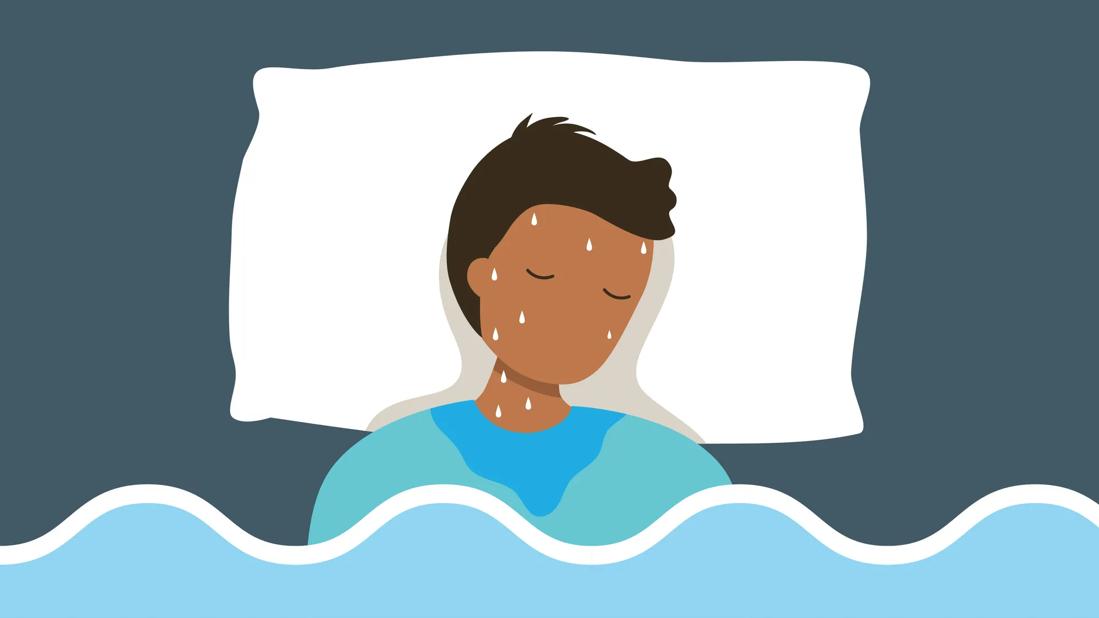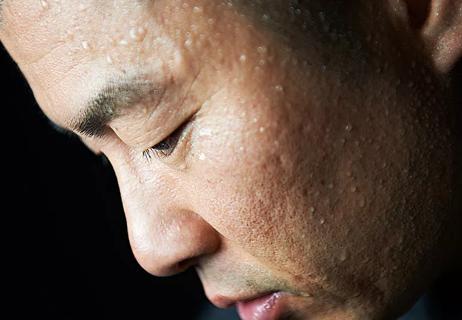If you’re waking up drenched, it could be menopause, stress, medications and other causes

If you sweat in your sleep, you know how annoying it can be. Waking up and needing to change your clothes or ... ugh, the sheets ... again ... can take a toll on your sleep and wreak havoc on your morning.
Advertisement
Cleveland Clinic is a non-profit academic medical center. Advertising on our site helps support our mission. We do not endorse non-Cleveland Clinic products or services. Policy
Sweating at night is a common concern and can be a real bother. How are you supposed to feel refreshed and ready for your day when you wake up flushed and sweating like you ran a marathon in your sleep?
We talked with family medicine physician Colleen Clayton, MD, about the common causes of night sweats and steps you can take to find some relief.
If you’re waking up drenched in sweat, you’ve got night sweats. It’s not the same as feeling a little clammy after a night of being cuddled up with too many blankets.
“Night sweats are intense episodes of heavy sweating in your sleep,” Dr. Clayton says. “If you have night sweats, it’s more than a matter of turning on a fan or kicking off the blankets.”
Sweating is your body’s natural response to help you cool down, like when you’re exercising or out in the hot sun.
But while you’re sleeping? Unless you’re burrowed under the comforter with the heater on full blast, you probably don’t need to sweat. And yet you do.
Why? Dr. Clayton shares some of the most common reasons.
Perhaps the best-known causes of night sweats are menopause and perimenopause (the transitional time before your periods end).
Here’s why: As you enter menopause, your body produces less estrogen, progesterone and testosterone. Those hormonal shifts are what cause your periods to become irregular and, eventually, stop altogether.
Advertisement
But they also trigger other changes in your body, including how your body regulates temperature.
That can lead to hot flashes during the day and sweating while you sleep.
By definition, you enter menopause when you haven’t had a period for a year. But night sweats can linger even after the onset of menopause. So, even if you’re in postmenopause, hormonal changes can still cause you to sweat in your sleep.
Several commonly used medications are also known to cause night sweats. These include:
If you’re concerned that your medication is making you sweat in your sleep or causing other unwanted side effects, talk with your healthcare provider about your options. Don’t stop taking medication without consulting them.
Ever find yourself sweating when you’re presenting at a big meeting? When your nervous system is on edge, it can bring on the sweat. And your fight-or-flight response doesn’t just kick in when you’re dealing with a momentary stressor, like driving at night in a blizzard. Stress can become chronic, and that can affect how your body works.
One of the ways your body deals with stress is by increasing your heart rate and narrowing your blood vessels. That heats up your body and can cause more sweat, day and night.
It’s no surprise that your body temperature can elevate when you’re fighting off a bug, like a cold, the flu or COVID-19. But even a low-grade fever can make you sweat in your sleep.
“Fevers themselves can lead to night sweats. But so can having the chills, which is typical of some viral infections,” Dr. Clayton points out. “When you have chills, you’re probably going to dress warmer and use more blankets. That can add to your odds of sweating at night, even if you don’t feel hot.”
Using (and abusing) alcohol and other substances can trigger a sweaty night.
“Drinking can increase anxiety, cause dehydration and raise your body temperature, all of which can lead to night sweats,” Dr. Clayton notes. Same goes for misusing prescription medications or using non-prescription drugs.
Alcohol and substance withdrawal can also cause night sweats.
If substances are interfering with your life, seek professional support for overcoming substance use disorder.
Several common chronic conditions are associated with night sweats, including:
Advertisement
Pinpointing what’s causing your nighttime sweat sessions can help you find ways to get some relief.
Start with setting the stage for a cool night: Keep your bedroom between 60 and 67 degrees Fahrenheit (15 degrees to 19 degrees Celsius) and sleep in lightweight PJs.
If that doesn’t do the trick, try:
Most causes of night sweats aren’t serious, Dr. Clayton says, “But there are enough causes that I recommend getting evaluated if your symptoms last more than a week. You deserve a good night’s rest — both for your own peace of mind and for your overall health.”
Advertisement

Sign up for our Health Essentials emails for expert guidance on nutrition, fitness, sleep, skin care and more.
Learn more about our editorial process.
Advertisement

Exercise, weather, anxiety, hormone changes and spicy foods can cause you to perspire more than usual

It can be a warning sign of low blood sugar or something more serious like a heart attack

Stay cool by wearing breathable clothes, eating certain foods and using an antiperspirant

One reduces the amount of sweat, while the other masks body odor

Tackle perspiration and odor by wearing breathable fabrics, showering after exercising and using an absorbent powder

The sweaty truth: why sweet smells turn foul

To avoid sleep deprivation and shift work sleep disorder, try adopting habits that minimize light exposure and prioritize daytime sleep

Sleep disorders, mental health conditions and other health concerns can all affect the quality of your sleep

Even small moments of time outdoors can help reduce stress, boost mood and restore a sense of calm

A correct prescription helps your eyes see clearly — but as natural changes occur, you may need stronger or different eyeglasses

Both are medical emergencies, but they are very distinct events with different causes